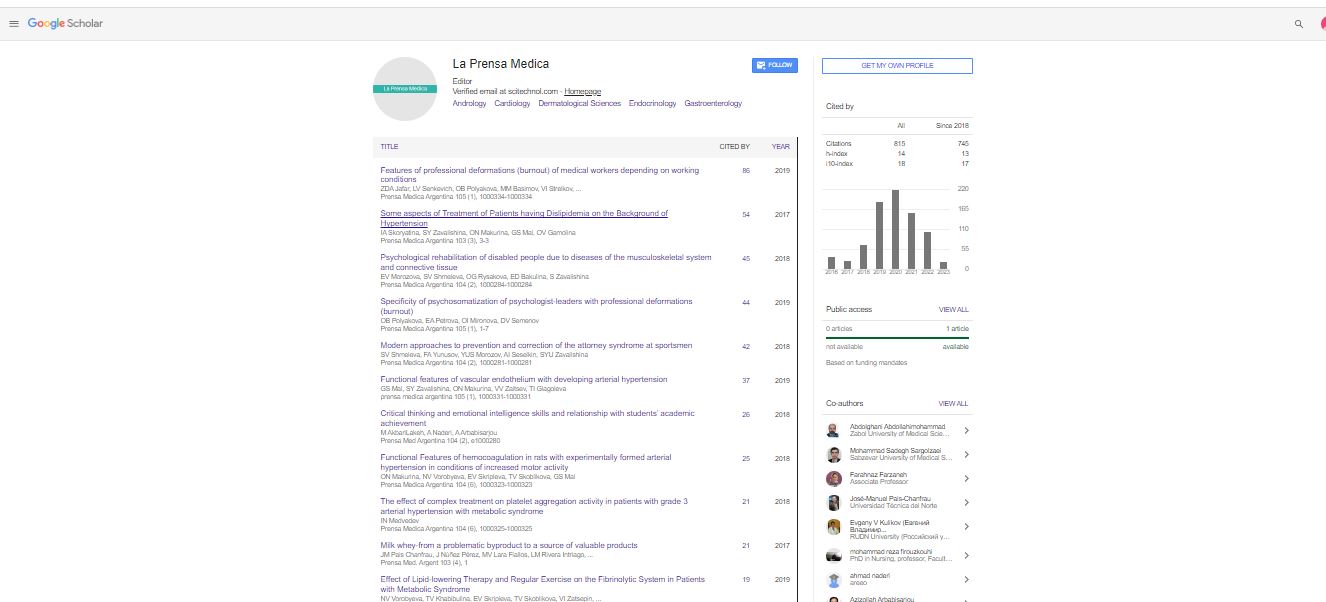Short Communication, La Prensa Medica Vol: 109 Issue: 4
The Dark Side of the Screen: Internet Gaming Disorder in the Digital Age
Glavak Karaoglan*
1Department of Health Sciences, University of Florence, Padiglione, Italy
*Corresponding Author: Glavak Karoglan,
Department of Health Sciences,
University of Florence, Padiglione, Italy
E-mail: kglavak5@unifi.it
Received date: 30 October, 2023, Manuscript No. LPMA-23-111738;
Editor assigned date: 01 November, 2023, PreQC No. LPMA-23-111738 (PQ);
Reviewed date: 16 November, 2023, QC No. LPMA-23-111738;
Revised date: 23 November, 2023, Manuscript No. LPMA-23-111738 (R);
Published date: 30 November, 2023, DOI: 10.4172/2324-8955.1000681
Citation: Karaoglan G (2023) The Dark Side of the Screen: Internet Gaming Disorder in the Digital Age. La Prensa Medica 109:4.
Abstract
In an era marked by technological advancements, the digital landscape has reshaped our lives in ways both profound and unprecedented. Among the many facets of this technological revolution, one phenomenon that has gained increasing attention is Internet Gaming Disorder (IGD).
Description
In an era marked by technological advancements, the digital landscape has reshaped our lives in ways both profound and unprecedented. Among the many facets of this technological revolution, one phenomenon that has gained increasing attention is Internet Gaming Disorder (IGD). As more individuals immerse themselves in virtual worlds and online gaming communities, the impact on mental health and well-being has become a subject of concern and investigation [1].
The allure of online gaming
Online gaming offers a captivating escape into virtual realms where players can assume alternate identities, conquer challenges, and engage in social interactions. The allure of these digital landscapes lies in their ability to provide instant gratification, a sense of achievement, and the chance to connect with others globally. However, this very allure also opens the door to potential adverse effects, especially when gaming transitions from a recreational activity to a compulsive behaviour [2].
Defining internet gaming disorder
Internet Gaming Disorder is characterized by excessive and persistent engagement in online gaming to the extent that it takes precedence over other life interests and daily activities. The condition encompasses a loss of control over gaming habits, continuation of gaming despite negative consequences, and the emergence of withdrawal symptoms when gaming is restricted. IGD's inclusion in the Diagnostic and Statistical Manual of Mental Disorders (DSM-5) as a condition warranting further research reflects the growing recognition of its significance [3].
The psychological toll
The effects of Internet Gaming Disorder extend beyond the virtual realm, impacting various aspects of psychological well-being. Excessive gaming can lead to disruptions in sleep patterns, compromised academic or occupational performance, strained relationships, and heightened stress and anxiety. In severe cases, IGD can exacerbate feelings of isolation, depression, and even suicidal ideation [4].
The role of escapism
One of the driving forces behind the development of IGD is the concept of escapism. Individuals may turn to online gaming as a way to escape from real-world stressors, anxiety, or feelings of inadequacy. The virtual world becomes a sanctuary where they can temporarily detach from their daily challenges. However, this temporary respite often leads to a cycle of dependency, further amplifying the potential for addiction [5].
The brain's reward system
The appeal of online gaming lies in its activation of the brain's reward system. The sense of achievement, recognition, and accomplishment that accompanies successfully completing in-game quests triggers the release of dopamine-a neurotransmitter associated with pleasure and motivation. The constant pursuit of these rewards can lead to a state of reinforcement that fuels compulsive gaming behavior [6].
Prevention and treatment
As the prevalence of IGD continues to rise, so does the importance of prevention and treatment strategies. Education and awareness campaigns aim to inform individuals about healthy gaming habits, the potential risks of excessive gaming, and the importance of balancing digital activities with other life pursuits. Cognitive-behavioral therapy and mindfulness techniques are often employed in therapeutic interventions to help individuals regain control over their gaming habits [7].
Cultivating digital wellness: The key lies in cultivating digital wellness, a state where online activities are enjoyed responsibly and do not compromise overall well-being. Establishing clear boundaries, designating screen-free times, and engaging in offline activities that bring joy and fulfilment are essential steps towards achieving this balance [8,9].
A call for balance: Internet Gaming Disorder serves as a reminder of the delicate equilibrium we must strike in the digital age. The transformative power of technology presents boundless opportunities, yet it also challenges us to navigate its terrain mindfully. Recognizing the signs of IGD, fostering open conversations, and promoting healthy tech habits are pivotal in safeguarding our mental and emotional health as we venture into the vast landscapes of the virtual world [10].
Conclusion
Internet Gaming Disorder underscores the potential consequences of excessive online gaming on mental health. While virtual realms offer excitement and connection, the line between recreation and compulsion is a fine one. By fostering awareness, encouraging responsible gaming, and nurturing a sense of digital wellness, we can navigate the digital age with both enthusiasm and mindfulness, ensuring that our virtual adventures enhance rather than undermine our overall well-being.
References
- Allahverdipour H, Bazargan M, Farhadinasab A, Moeini B (2010) Correlates of video games playing among adolescents in an Islamic country. BMC Public Health 10(1): 1-7.
- Balhara YPS, Kattula D, Singh S, Chukkali S, Bhargava R (2020). Impact of lockdown following COVID-19 on the gaming behavior of college students. Indian J Public Health 64(6): 172-176.
- Bonnaire C, Phan O (2017). Relationships between parental attitudes, family functioning and Internet gaming disorder in adolescents attending school. Psychiatry Res 255:104-110.
- Bonnaire C, Liddle HA, Har A, Nielson P, Phan O (2019). Why and how to include parents in the treatment of adolescents presenting with Internet gaming disorder? J Behav Addict 8(2): 201-212
- Brooks GA, Clark L (2019). Associations between loot box use, problematic gaming and gambling, and gambling-related cognitions. Addict Behav 96: 26-34.
- Brunborg GS, Mentzoni RA, Frøyland LR (2014). Is video gaming, or video game addiction, associated with depression, academic achievement, heavy episodic drinking, or conduct problems? J Behav Addict 3(1): 27-32.
- Fineberg NA, Demetrovics Z, Stein DJ, Ioannidis K, Potenza MN et al. (2018) Manifesto for a European research network into problematic usage of the Internet. Eur Neuropsychopharmacol 28(11):1232-1246
- Chaput JP, Klingenberg L, Astrup A, Sjödin AM. (2011) Modern sedentary activities promote overconsumption of food in our current obesogenic environment. Obes Rev 12(5): 12-20.
- Achab S, Nicolier M, Mauny F, Monnin J, Trojak B, et al. (2011). Massively multiplayer online role-playing games: comparing characteristics of addict vs non-addict online recruited gamers in a French adult population. BMC Psychiatry 11(1); 1-12.
- Campbell AJ, Cumming SR, Hughes I (2006) Internet use by the socially fearful: addiction or therapy? Cyberpsychol Behav 9(1):69-81.
 Spanish
Spanish  Chinese
Chinese  Russian
Russian  German
German  French
French  Japanese
Japanese  Portuguese
Portuguese  Hindi
Hindi 

